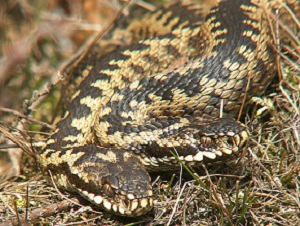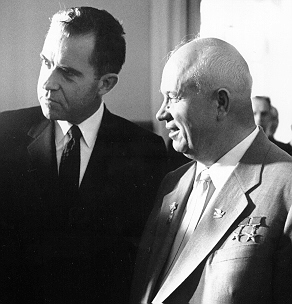Гадюка
The Russian word гадюка means 'viper' or 'adder'. It declines like so:
| Sg | Pl | |
| Nom | гадюка | гадюки |
| Acc | гадюку | гадюк |
| Gen | гадюки | гадюк |
| Pre | гадюке | гадюках |
| Dat | гадюке | гадюкам |
| Ins | гадюкой | гадюками |
There are a few species of vipers that live in Russia, not very many though. When it's starts to get really cold in Russia, the snakes start migrating indoors, especially in rural towns. Waking up to find a snake in your living room doesn't sound very fun. Warnings are usually issued during the colder parts of the year regarding snake home invasions. That's not the kind of viper I'd like to be surprised with in my driveway.

Photo Credit: Piet Spaans, CC-BY-SA-2.5, via Wikimedia Commons
Here are some example sentences:
| Не ходите туда! В унитазе гадюка! | Don't go in there! There's a viper in the toilet! |
| Меня укусила гадюка! Высоси яд! | The viper bit me! Suck out the venom! |
| Идиот! Нет гадюки в гостиной! Ты выпил, что ли? | You idiot! There's no viper in the living room! Have you been drinking or what? |
| Не волнуйтесь, это была не гадюка, a шланг просто. | Don't worry, it wasn't a viper, it was just a hose. |
Сейчас
Russian distinguishes two words for ‘now,’ one of which means ‘nowadays,’ and the other means ‘at this moment.’ The one that means ‘now, at this moment’ is сейчас. Beginning Russian students in the US often have а disgustingly limited knowledge of grammar, so for them I have this piece of advice: if your instructor asks you to what part of speech a particular word belongs and if you have absolutely no idea, then guess ‘adverb.’ Consider this dialog:
| Glorious instructor: | “What part of speech is сейчас?” |
| Vapid student: | “It's an adverb.” |
| Glorious instructor: | “Correct!” |
You see? By taking RWOTD's sage advice the vapid student now has curried the instructor's favor and will doubtless eventually enter grad school.
Here are a few example sentences:
| Мама сейчас на работе. | Mom is at work now. |
| — Хочешь пойти со мной в кино? — Извини, но я сейчас занята. |
“Do you want to go to the movies with me?” “Sorry, but I'm busy now.” |
| — Почему ты сейчас здесь? — Потому что не хочу идти домой. |
“Why are you here now?” “Because I don't want to go home.” |
Interestingly enough, сейчас can also mean “right away”:
| — Ваня, где ты? Приди домой поскорей, а то тебя накажут. — Я сейчас буду! |
“Vanya, where are you? Come home right away or you'll be in trouble.” “I will be right there!” |
| Я сейчас приготовлю ужин, а потом мы пойдём в кино. | I'll make dinner right away, then we will go to the movie. |
«Я покажу тебе Кузькину мать!»
«Я покажу тебе Кузькину мать!» is a Russian idiom that is very hard to translate. It is often used as a threat. In essence it means: "I'll show you what's what!" It can also mean "to give somebody a hard time." It literally translates to: "I'll show you Kuzka's mother!", but that doesn't really make sense in English. Who the heck is Kuzka? And why are we bringing his mother into this? There have been many theories about the origin of the phrase. Some are more farfetched than others. One idea is that Kuzka was a ghost mother that lived behind stoves, and would scare away anyone that saw her. Another theory is that Kuzka was a kind of crop eating beetle that would destroy farmers' harvests, so the sight of the beetles' eggs, or "mother" would indicate that the crop was in jeopardy. There is also a theory that the phrase refers to a riding whip, called a kuzka, that a groom would keep in his boot during the wedding, signifying his dominance over his fiancee.
Whatever the origin, the phrase was popularized by former Soviet leader Nikita Khruschev. He liked using the phrase because of it's ambiguity. He enjoyed stumping his interpreters, who would often times try to translate the phrase literally, which would lead to very puzzled looks on the faces of his American counterparts. For a time in the Cold War the phrase was used as a metaphor for the Atomic Bomb. Nowadays, though, it is used more humorously, and is used to do comical impersonations of Khruschev. It is not as common anymore, but it can still be used in a threatening manner.

Photo Credit: NARA [Public domain], via Wikimedia Commons
Here are some examples:
| — Я не уверен, что вы выиграете завтра. — Мы покажем тебе Кузькину мать! |
“I don't think you'll win the game tomorrow.” “We’ll show you!” |
|
— Ты всегда будешь неудачником! — Я покажу тебе Кузькину мать! |
“You'll never be a success.” “I'll prove you wrong!” |
Вести
The verb вести means to guide someone somewhere. It's a unidirectional verb that conjugates like this:
| Imperfective | |
| Infinitive | вести |
| Past | вёл вела вело вели |
| Present | веду ведёшь ведёт ведём ведёте ведут |
| Future |
буду вести будешь вести будет вести будем вести будете вести будут вести |
| Imperative | веди(те) |
Unidirectional verbs have multiple interpretations. The first one is applicable when you spot someone going somewhere with someone else.
| — Куда ты идёшь? — Я веду дочку в школу. |
“Where are you going?” “I'm taking my daughter to school.” |
Unidirectional verbs in the present tense also have the meaning of ‘intent in the immediate future’:
| — Какие у Ивана планы на вечер? — Он ведёт гостей из Астрахани на дискотеку. |
“What are Ivan's plans for the evenging?” “He's taking his guests from Astrakhan to a club.” |
In the past tense they focus on action in progress at a particular point of time:
| — Куда ты шла, когда я тебя увидел возле почты? — Я вела бабушку к врачу. |
“What were you doing yesterday when I saw you near the post office?” “I was taking my grandmother to the doctor.” |
Храпеть
The Russian word храпеть means 'to snore'. It conjugates like this:
| Imperfective | Perfective | |
| Infinitive | храпеть | похрапеть |
| Past | храпел храпела храпело храпели |
похрапел похрапела похрапело похрапели |
| Present | храплю храпишь храпит храпим храпите храпят |
No such thing as perfective present in Russian. |
| Future |
буду храпеть будешь храпеть будет храпеть будем храпеть будете храпеть будут храпеть |
похраплю похрапишь похрапит похрапим похрапите похрапят |
| Imperative | храпи(те) | похрапи(те) |

Here are some examples:
| Он храпел всю ночь. | He snored all night long. |
|
— Ты выглядишь ужасно. — Hу, я не мог уснуть вчера ночью. Моя жена храпелa, как порося. |
"You look terrible." "Well, I couldn't fall asleep last night. My wife was snoring like a piglet." |
| Он храпел каждую ночь, поэтому она навалилась на его и задушила подушкой. | He snored every night, so she stuffed a pillow in his face and smothered him. |
| Она громко храпит, но мне всё равно. | She snores loudly, but I don't mind. |